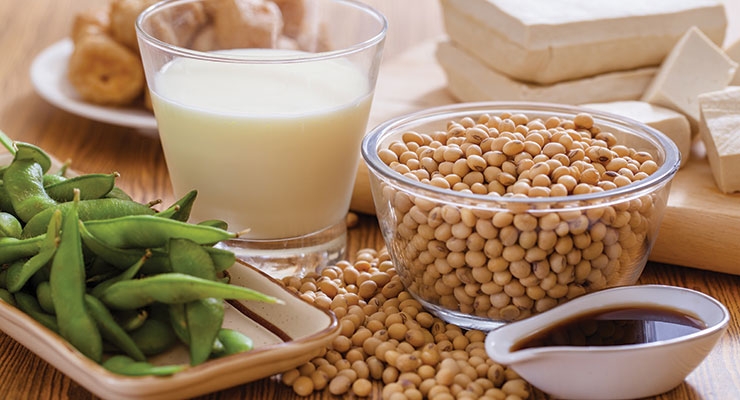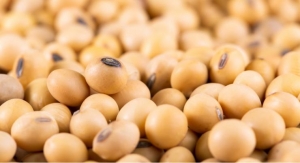Mian N. Riaz, PhD, Texas A&M University04.01.16
Soy products have been used extensively in Asia as a source of protein and energy for at least 4,000 years. Soybeans serve multiple functions in today’s global food chain. The bean is used as both an edible oil and a source of protein in prepared foods. Soybeans have great potential for human nutrition because of their high level of quality protein, and their unique functional and nutritional properties. Soy protein supplies all nine essential amino acids and provides many functional benefits to food processors.
Health Benefits
Since the 1960s, soy protein has been used as nutritional and functional food ingredients in every food category available to consumers. There is ample evidence that soy protein has a positive influence on health. Soy protein products can be an “excellent source” of dietary fiber. This merits special attention because dietary fiber appears to play a role in controlling blood cholesterol, and may have an effect in preventing colon cancer and improving glucose tolerance. Soy proteins also contain isoflavones, saponins and phytic acid, which may offer additional health advantages.
Traditional soyfoods, such as tofu, soymilk and tempeh have been consumed for centuries by Asian populations. In the U.S. and Europe, modern soy products, such as soy flour, concentrates, isolates and textured soy protein, have been used for decades to boost nutrition and solve formulation challenges. Soy protein can be found in a variety of foods, ranging from milk to burgers to nut products. Soybean-based ingredients in the form of soy protein concentrates (refined soy protein isolate or tofu) can be used alone or mixed with other ingredients to create meat-alternative products. Soy protein concentrate and isolates have also found their way into more indulgent food products, such as yogurts and smoothies. The industry is seeing increased usage across categories because soy products provide emulsion and foaming properties, which are important for beverages.
Consumers continue to demand food with improved nutrition profiles. They want their favorite products to be formulated with fewer bad fats and other unhealthy attributes. Consumers are also demanding products with added nutritional components, such as protein, fiber and vitamins.
Product Opportunities
The wide range of functional properties and high nutritive value of soybeans makes them ideal ingredients for an array of food and nutritional products. The food industry has seen an increased acceptance of soy protein in recent years due to its versatile qualities and functional properties in food applications. Several food industries are forecasting increased demand for soy nutrition and are proactively working to bring products containing soyfoods to retail. Conventional breads, crackers and breakfast cereals are likely to be particularly attractive categories. Plus, the health halo of soy protein has captured the interest of product developers in other food categories, which may influence product development in the near future.
The main functional properties of soy proteins that can help develop functional and nutraceutical foods are: hydrating capacity, rehydration, solubility, dispersibility, colloidal stability, gelation, emulsification, acid coagulation, foaming and adhesion/cohesion. Additionally, soy proteins can be applied as a fat substitute in items such as meat, fish, milk, cereal-based products and infant formula.
One of the most important properties of proteins in food systems is their ability to form gels after heating. Heat gelation contributes to textural properties; it shapes the product, holds other food components, and retains water in the product. Most functional soy protein ingredients are used to accomplish some specific objectives, such as to bind or immobilize fat and water; improve sensory or organoleptic properties; improve shelf life; regulate viscosity; and modify gel structure. Soy ingredients promote moisture and flavor retention, aid emulsification and also enhance the texture of many foods—from a variety of meats to peanut butter, frozen desserts and even cheese.
For product developers, soy protein contributes valuable functional characteristics in processing systems and offers full digestibility. Both isolated and concentrated soy proteins are easily digested by humans and equal the protein quality of milk, meat and eggs. Moreover, soy proteins are acceptable in almost all diets because they contain virtually no cholesterol and are lactose-free. The nutritional value of soy protein provides the consumer with a cholesterol-free, lower-fat alternative to animal protein.
Soy proteins are widely used as food ingredients. Their flavor, color and high protein content are great advantages in their application to dairy products, especially when a high level of protein is required. Soy proteins are now used to stabilize food emulsions, which were conventionally stabilized by sodium caseinate (a milk protein).
Marketing Challenges & Dynamics
The global soyfoods market reached $42.3 billion in 2015, according to a report by Global Industry Analysts, Inc. The demand for soyfoods and the associated proteins will only grow due to the modernization of the food industry and the ease with which soy proteins can be incorporated into a variety of foods.
Internationally, soybeans are a key ingredient in thousands of food products; they provide a complete protein, a healthy fat and valuable phytonutrients. In Western countries such as Australia, soymilk, meat-alternatives and cultured soy products are popular food choices among locals. In developing nations, such as portions of Africa, Latin America and India, dry textured soy protein is used widely as a low-cost meat alternative, while soymilk in liquid and powdered form is becoming more popular.
The main drivers for the soy market are low cost and functionality. Soy protein ingredients, by virtue of being lower in the value chain, will always be less expensive than animal-based ingredients. Soy is extremely versatile and functional; the proteins can be easily formulated into existing food products as a nutritional enhancement, low-cost extender, emulsifying agent, or to improve texture and extend shelf-life.
A regional market driver in Western countries is broader availability of soyfood products. The industry has seen larger food companies enter the market and expand product lines. Soyfoods are now available in mainstream supermarkets and restaurants, and consumption trends are increasingly growing for vegetable protein products due to increased awareness of their dietary health benefits.
Future Outlook
In summary, soy protein use in various foods has increased sales in general. According to a Markets and Markets report, the market for soy protein ingredients was $7.11 billion in 2015, and is projected to reach $10.12 billion by 2020, at a compound annual growth rate of 7.3%.
The driving factors for this market are the change in consumption patterns and food requirements, and an inclination toward vegetable products for protein sources. Leading companies in the soy protein ingredients market are continuously developing new products to serve customers with better nutritional quality. Thus, the soy protein ingredients market has been gaining global acceptance among consumers, and demand is high for food industries such as bakery, functional foods and infant foods.
Dr. Riaz wrote this article in partnership with Soy Connection by the United Soybean Board.
Health Benefits
Since the 1960s, soy protein has been used as nutritional and functional food ingredients in every food category available to consumers. There is ample evidence that soy protein has a positive influence on health. Soy protein products can be an “excellent source” of dietary fiber. This merits special attention because dietary fiber appears to play a role in controlling blood cholesterol, and may have an effect in preventing colon cancer and improving glucose tolerance. Soy proteins also contain isoflavones, saponins and phytic acid, which may offer additional health advantages.
Traditional soyfoods, such as tofu, soymilk and tempeh have been consumed for centuries by Asian populations. In the U.S. and Europe, modern soy products, such as soy flour, concentrates, isolates and textured soy protein, have been used for decades to boost nutrition and solve formulation challenges. Soy protein can be found in a variety of foods, ranging from milk to burgers to nut products. Soybean-based ingredients in the form of soy protein concentrates (refined soy protein isolate or tofu) can be used alone or mixed with other ingredients to create meat-alternative products. Soy protein concentrate and isolates have also found their way into more indulgent food products, such as yogurts and smoothies. The industry is seeing increased usage across categories because soy products provide emulsion and foaming properties, which are important for beverages.
Consumers continue to demand food with improved nutrition profiles. They want their favorite products to be formulated with fewer bad fats and other unhealthy attributes. Consumers are also demanding products with added nutritional components, such as protein, fiber and vitamins.
Product Opportunities
The wide range of functional properties and high nutritive value of soybeans makes them ideal ingredients for an array of food and nutritional products. The food industry has seen an increased acceptance of soy protein in recent years due to its versatile qualities and functional properties in food applications. Several food industries are forecasting increased demand for soy nutrition and are proactively working to bring products containing soyfoods to retail. Conventional breads, crackers and breakfast cereals are likely to be particularly attractive categories. Plus, the health halo of soy protein has captured the interest of product developers in other food categories, which may influence product development in the near future.
The main functional properties of soy proteins that can help develop functional and nutraceutical foods are: hydrating capacity, rehydration, solubility, dispersibility, colloidal stability, gelation, emulsification, acid coagulation, foaming and adhesion/cohesion. Additionally, soy proteins can be applied as a fat substitute in items such as meat, fish, milk, cereal-based products and infant formula.
One of the most important properties of proteins in food systems is their ability to form gels after heating. Heat gelation contributes to textural properties; it shapes the product, holds other food components, and retains water in the product. Most functional soy protein ingredients are used to accomplish some specific objectives, such as to bind or immobilize fat and water; improve sensory or organoleptic properties; improve shelf life; regulate viscosity; and modify gel structure. Soy ingredients promote moisture and flavor retention, aid emulsification and also enhance the texture of many foods—from a variety of meats to peanut butter, frozen desserts and even cheese.
For product developers, soy protein contributes valuable functional characteristics in processing systems and offers full digestibility. Both isolated and concentrated soy proteins are easily digested by humans and equal the protein quality of milk, meat and eggs. Moreover, soy proteins are acceptable in almost all diets because they contain virtually no cholesterol and are lactose-free. The nutritional value of soy protein provides the consumer with a cholesterol-free, lower-fat alternative to animal protein.
Soy proteins are widely used as food ingredients. Their flavor, color and high protein content are great advantages in their application to dairy products, especially when a high level of protein is required. Soy proteins are now used to stabilize food emulsions, which were conventionally stabilized by sodium caseinate (a milk protein).
Marketing Challenges & Dynamics
The global soyfoods market reached $42.3 billion in 2015, according to a report by Global Industry Analysts, Inc. The demand for soyfoods and the associated proteins will only grow due to the modernization of the food industry and the ease with which soy proteins can be incorporated into a variety of foods.
Internationally, soybeans are a key ingredient in thousands of food products; they provide a complete protein, a healthy fat and valuable phytonutrients. In Western countries such as Australia, soymilk, meat-alternatives and cultured soy products are popular food choices among locals. In developing nations, such as portions of Africa, Latin America and India, dry textured soy protein is used widely as a low-cost meat alternative, while soymilk in liquid and powdered form is becoming more popular.
The main drivers for the soy market are low cost and functionality. Soy protein ingredients, by virtue of being lower in the value chain, will always be less expensive than animal-based ingredients. Soy is extremely versatile and functional; the proteins can be easily formulated into existing food products as a nutritional enhancement, low-cost extender, emulsifying agent, or to improve texture and extend shelf-life.
A regional market driver in Western countries is broader availability of soyfood products. The industry has seen larger food companies enter the market and expand product lines. Soyfoods are now available in mainstream supermarkets and restaurants, and consumption trends are increasingly growing for vegetable protein products due to increased awareness of their dietary health benefits.
Future Outlook
In summary, soy protein use in various foods has increased sales in general. According to a Markets and Markets report, the market for soy protein ingredients was $7.11 billion in 2015, and is projected to reach $10.12 billion by 2020, at a compound annual growth rate of 7.3%.
The driving factors for this market are the change in consumption patterns and food requirements, and an inclination toward vegetable products for protein sources. Leading companies in the soy protein ingredients market are continuously developing new products to serve customers with better nutritional quality. Thus, the soy protein ingredients market has been gaining global acceptance among consumers, and demand is high for food industries such as bakery, functional foods and infant foods.
Dr. Riaz wrote this article in partnership with Soy Connection by the United Soybean Board.




























